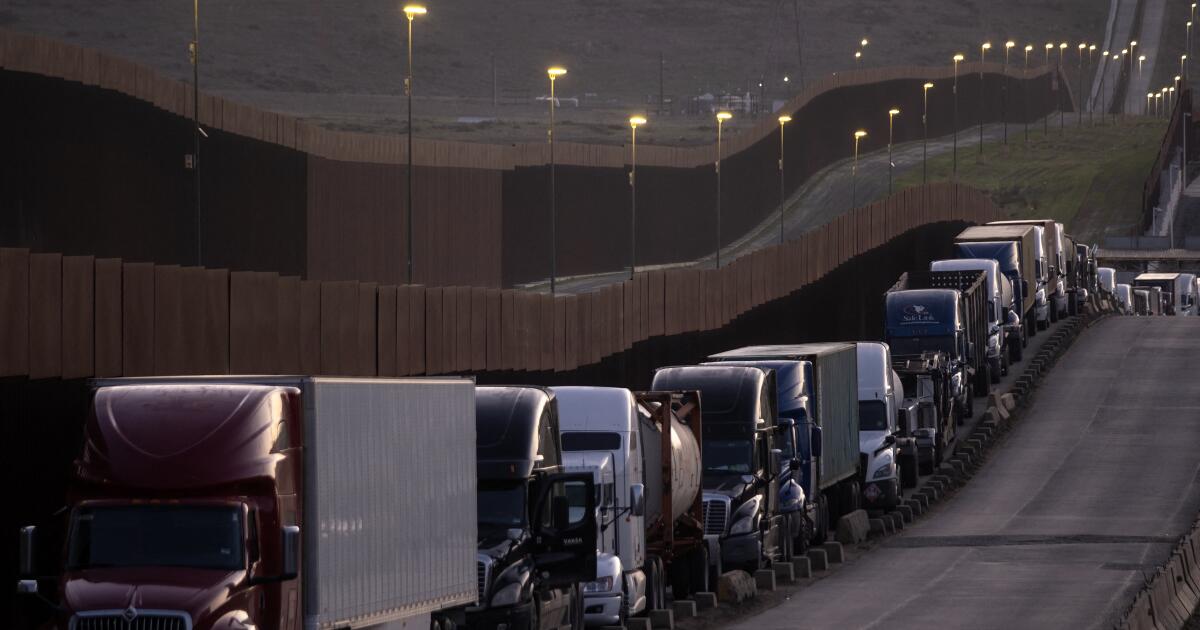MEXICO CITY — The presidents of Mexico and the United States said Thursday that punishing new tariffs on Mexican goods exported across the border would be put off for 90 days as the two nations continue negotiations on the contentious levies.
Word of the reprieve came a day after South Korea announced a trade pact with the U.S. and as countries worldwide scrambled to hammer out trade deals by Friday, the day President Trump said new tariffs would take effect.
It was the sole exception to a deadline Trump said would bring hefty rate hikes to other, major trading partners of the United States, including Brazil, Canada and India, among dozens of other nations that have thus far declined to enter framework trade agreements on strict terms set by the president.
Earlier this week, Trump wrote on social media: “THE AUGUST FIRST DEADLINE IS THE AUGUST FIRST DEADLINE — IT STANDS STRONG, AND WILL NOT BE EXTENDED.”
U.S. Commerce Secretary Howard Lutnick told Fox News the same on Sunday: “No extensions, no more grace periods. Aug. 1, the tariffs are set, they’ll go into place.”
But that didn’t happened, at least not in Mexico. The long-awaited announcement of a delay came after Trump and Mexican President Claudia Sheinbaum had a morning telephone conversation, the latest in a series of phone calls in which the Mexican leader has urged her U.S. counterpart not to impose more tariffs on her nation — the United States’ largest trading partner.
Trump called the phone conversation “very successful” in a post on Truth Social, adding: “More and more, we are getting to know and understand each other.” The two North American leaders have yet to meet in person.
In her morning news conference, a clearly relieved Sheinbaum cast the postponement as a major victory for Mexico. “We have 90 days to keep on talking with President Trump,” declared a smiling Sheinbaum. “It was a very good agreement. We remain where we are.”
In his comments, Trump said that many Mexican imports would continue to face a 25% tariff that the president has said is needed to force Mexico to cut down on smuggling of fentanyl, the synthetic opioid linked to tens of thousands of deaths in the United States.
While Trump held off on a planned 30% tariff on some Mexican imports, he declined to revise his existing tariff regimen, which Mexican officials view as egregious and harmful to the economy. Trump was firm that Washington would continue to charge the levies that he had already imposed — including the 25% “fentanyl tariff.” Mexican officials say their enforcement actions have resulted in a drastic drop in fentanyl trafficking.
Also to be retained, Trump said, would be a 25% tariff on auto imports and a 50% tax on imports from Mexico of steel, aluminum and copper. Mexico, Trump said, had agreed to “immediately terminate” its non-tariff trade barriers. It was not immediately clear what policies he was referring to.
Mexican officials are seeking to reduce or eliminate Trump tariffs on a wide array of goods. Those include a 17% tariff imposed in mid-July on some $3 billion in annual tomato exports to the United States.
Sheinbaum said that her country’s “cool headed” approach to negotiating with the U.S. had succeeded in holding off more crippling tariffs while also defending “our principles with firmness.”
Mexico had managed to negotiate a privileged position in the “new global commercial order” launched by the Trump administration and his protectionist trade dictates, she said.
“We have the best possible agreement, including when compared to other nations,” Sheinbaum said.
This week Trump has continued to make tariffs a centerpiece of his foreign policy, using them to express his displeasure with allies as well as adversaries. On Wednesday, he said the U.S. would impose 25% tariffs on goods from India. That same day he signed an executive order to place 50% tariffs on Brazil, starting next week.
On Thursday, Trump said that Canada’s decision to recognize a Palestinian state would make it harder to reach a deal with America’s northern neighbor.
“Wow! Canada has just announced that it is backing statehood for Palestine,” Trump wrote on Truth Social. “That will make it very hard for us to make a Trade Deal with them. Oh’ Canada!!!”
The Trump administration and Canadian government have remained at loggerheads over Trump’s threats of new tariffs.
This year’s protracted U.S.-Mexico trade drama has seen the on-again, off-again tariff threats from Trump sounding recurrent alarms of a Mexican economic collapse. Throughout, Sheinbaum has stressed the value of negotiation over confrontation, refusing to strike back rhetorically at Trump’s verbal provocations.
“President Trump has his own way of communicating,” Sheinbaum has said on several occasions.
On Thursday, Sheinbaum stressed that Mexico had managed to preserve, for now, the 2020 North American free-trade deal — the United States-Mexico-Canada Agreement — signed into law by Trump during his first term. The pact allows duty-free entry of most Mexican goods into the United States and Canada.
The agreement is a linchpin of the Mexican economy. Mexico has become an export-dependent nation in recent decades, and the United States accounts for more than 80% of the country’s exports. U.S. total goods traded with Mexico topped $839 billion in 2024, according to U.S. figures.
“T-MEC has been safeguarded,” Sheinbaum said, using the Spanish acronym for the trade accord, known as USMCA in English. “That is very important.”
Special correspondent Cecilia Sánchez Vidal contributed to this report. McDonnell reported from Mexico City and Padilla from Los Angeles.
